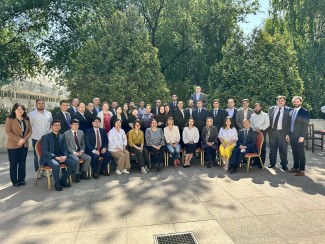Supporting displaced people from Afghanistan and host communities in neighbouring countries – UNODC regional workshop on drug use prevention, treatment and care

From 5th to 9th June, UNODC organized a hybrid regional workshop with a total of 42 participants from the government, civil society organizations (CSOs) and UN agencies, to assist the strengthening of evidence-based prevention, treatment and care strategies and responses in support of vulnerable communities including displaced Afghan people as well as host communities in the neighbouring countries of Afghanistan.
Displacement and humanitarian emergencies can enhance vulnerabilities for the onset of substance use and the development of substance use disorders. The majority of displaced populations are hosted in low- and middle-income countries and local communities might already struggle to provide effective services for people with mental health and substance use disorders, as globally only one in every five persons with a drug use disorder has access to treatment. Often there is a lack of trained health and social professionals who can address drug use disorders as biopsychosocial health disorders and respond effectively. While large parts of the global opium produced and increasingly also stimulants produced come from Afghanistan1, at the same time many people in Afghanistan are facing health and social problems associated with their substance use and the shortage of substance use disorders treatment and care services, especially for women.
The humanitarian situation in Afghanistan worsened significantly since August 2021 and the provision of international aid has become more and more challenging. The number of refugees and asylum-seekers from Afghanistan was estimated to be 5.2 million (23% women and 47% children) with majority of them staying in Iran, Pakistan and Central Asia s of the end of 2022.
As a response to these developments, the workshop was organized with those engaging in drug demand reduction or working closely with displaced people: policymakers, technical experts/representatives of civil society and UN partners including the International Organization for Migration (IOM), United Nations High Commissioner for Refugees (UNHCR), UN Women and World Health Organization (WHO) from eight countries (Afghanistan, Iran, Kazakhstan, Kyrgyzstan, Pakistan, Tajikistan, Turkmenistan and Uzbekistan). The workshop addressed the identification of local needs and challenges and discussed options to avail evidence-based drug use prevention, treatment and care responses in host communities and for displaced Afghan people residing their neighbouring countries.
The regional workshop consisted of plenary sessions that allowed active interaction and information sharing of the challenges and practices encountered in each country, as well as specialized sessions on evidence-based prevention and treatment responses, designed and adapted for resource-limited settings, namely a) UNODC Strong Families, a selective family-based drug use prevention programme, or b) UNODC Treatnet adapted as essential treatment and care for people with drug use disorders in humanitarian settings. In addition, country presentations also allowed participants to examine local situations, share information and work together to develop relevant support programmes. The workshop entailed a series of group discussions, which enabled country delegations to learn from each other and consider potential interventions to be translated into action plans to address the needs of people at risk of or with substance use disorders in the region through scalable prevention and treatment responses.
One Afghan person in displacement shared their challenging situations, stating, “one of the most concerning issues is the education of our teenage children ... another problem is lack of financial ability to go for health services, especially to private hospitals and insufficient accessibility to international aids ... paying attention to these problems will greatly save ourselves, children and entire family from involvement in drug abuse and drug-related illegal activities”.
The regional workshop served as an opportunity for policymakers and stakeholders from each country to identify areas of priority and collaboration with national, regional and international partners. Participants were committed to support the young generations in the region to grow into healthy adults that live in a safe environment, resilient to drugs and drug-related crime.
UNODC, in collaboration with its partners from governments, civil societies, relevant UN and regional partners, stands ready to further support the region and displaced populations in the region, starting with the implementations of the action plans developed during the workshop and this enhancing public health and public safety for people in Afghan and the entire region.
This event was organized by the UNODC Prevention, Treatment and Rehabilitation Section (PTRS), in coordination with the Regional Office for Central Asia (ROCA), the Regional Programme for Afghanistan and neighbouring countries (RP), Country Office for Afghanistan (COAFG), Iran (COIRA), Kazakhstan and respective field offices.
Related links – drug use prevention, treatment and care for drug use disorders in crisis: